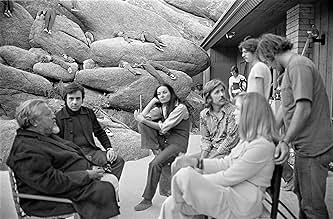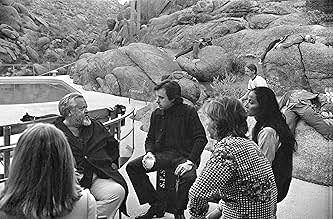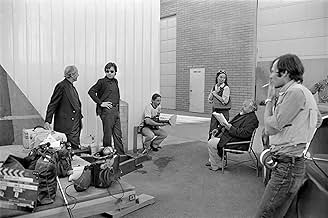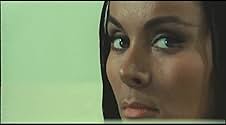NOTE IMDb
6,7/10
8,3 k
MA NOTE
Un réalisateur hollywoodien émerge de semi-exil avec l'intention de terminer son travail sur un film innovant.Un réalisateur hollywoodien émerge de semi-exil avec l'intention de terminer son travail sur un film innovant.Un réalisateur hollywoodien émerge de semi-exil avec l'intention de terminer son travail sur un film innovant.
- Réalisation
- Scénario
- Casting principal
- Récompenses
- 9 victoires et 8 nominations au total
Robert Random
- John Dale
- (as Bob Random)
Avis à la une
A famed, and infamous, movie director, JJ Hannaford, dies in a car accident. He was about to release his latest movie and a documentary camera crew had been following him around in the days preceding his death. We see the events leading up to his death, the careers Hannaford destroyed, the enemies he made and his last film, The Other Side of the Wind.
Written and directed by the great Orson Welles, this movie has taken nearly 50 years to be released. Welles started shooting it in 1970 and by his death in 1985 it had not been released. Production issues and politics prevented this. Now, in 2018, Netflix has released it. Being a huge fan of Orson Welles, the thought of seeing his long-dormant final film released was an exciting one.
However, the final product is quite disappointing. It looks and feels unfinished, a mashup of random scenes. While watching I thought that this was due to the film being in an unedited state when Welles died and it was edited to the final version after his death. Turns out the final version had already been edited by Welles, so we can't blame Netflix's production team.
The film-within-a-film element was initially intriguing but is ultimately confusing. What is part of Hannaford's film and what is Welles's film? Are the pretentious, trippy, hippy sequences and the gratuitous nudity and sex scenes Welles trying to appeal to early-70s arty audiences or his take on the pretentiousness of modern movies?
I would like to think that one of the themes of the movie is the pretentiousness of Hollywood, so will give Welles the benefit of the doubt on the content. However, it does become a jarring, disconcerting experience when you have seemingly-gratuitous scenes like those thrown randomly into the movie.
This said, it is not all bad. Welles's take on Hollywood, its movies and the pretentiousness of the times is well directed (if, indeed, that was his aim. It's so difficult to tell). The mystery surrounding John Dale adds intrigue. The story of JJ Hannaford is interesting and John Huston is perfect in the role. He pretty much just had to play himself!
Even here, however, Welles overeggs the pudding. I would have been more engaged in the Hannaford story if there weren't so many scenes that added nothing to plot or character development. So many scenes that just take up space and so much long, pointless dialogue. There's no momentum to the movie at all and the ending is a damp squib.
Written and directed by the great Orson Welles, this movie has taken nearly 50 years to be released. Welles started shooting it in 1970 and by his death in 1985 it had not been released. Production issues and politics prevented this. Now, in 2018, Netflix has released it. Being a huge fan of Orson Welles, the thought of seeing his long-dormant final film released was an exciting one.
However, the final product is quite disappointing. It looks and feels unfinished, a mashup of random scenes. While watching I thought that this was due to the film being in an unedited state when Welles died and it was edited to the final version after his death. Turns out the final version had already been edited by Welles, so we can't blame Netflix's production team.
The film-within-a-film element was initially intriguing but is ultimately confusing. What is part of Hannaford's film and what is Welles's film? Are the pretentious, trippy, hippy sequences and the gratuitous nudity and sex scenes Welles trying to appeal to early-70s arty audiences or his take on the pretentiousness of modern movies?
I would like to think that one of the themes of the movie is the pretentiousness of Hollywood, so will give Welles the benefit of the doubt on the content. However, it does become a jarring, disconcerting experience when you have seemingly-gratuitous scenes like those thrown randomly into the movie.
This said, it is not all bad. Welles's take on Hollywood, its movies and the pretentiousness of the times is well directed (if, indeed, that was his aim. It's so difficult to tell). The mystery surrounding John Dale adds intrigue. The story of JJ Hannaford is interesting and John Huston is perfect in the role. He pretty much just had to play himself!
Even here, however, Welles overeggs the pudding. I would have been more engaged in the Hannaford story if there weren't so many scenes that added nothing to plot or character development. So many scenes that just take up space and so much long, pointless dialogue. There's no momentum to the movie at all and the ending is a damp squib.
The Other Side of the Wind is not a perfect film, but perhaps the perfect film to punctuate Orson Welles' incredible and monolithic career, and certainly the most appropriate film to leave unfinished due to difficulty in production. Or perhaps it is the genius of Welles to have left the film unfinished on purpose?
The film focuses on "the man, the myth, the legend" type J.J. Hannaford, who is making his comeback film after a long hiatus of being out of touch with the modern movie realm. He celebrates his birthday by having a documentary team, friends, associates, and others join him for a showing of his new film "The Other Side of the Wind" starring his striking new lead actor Johnny Dale and lead actress (who is nameless according to the bill). What ensues is a chaotic, fast-paced bombardment of quick edits, snappy dialog, a movin' sound track, and fantastic camera-work sandwiched between the hypnotic, near-legato, orchestral moments of Hannaford's film "The Other Side of the Wind".
It took me about 25 min to get used to the faced-paced, almost bravado tone of the editing because I wanted more time to saturate the emotions and facial expressions of the characters. This is why I think the sections that show Hannaford's film stick out even more though; finally having time to "breath" (if you will) versus the zaniness of being in the business (reality). It even feels at times that Hannaford himself is drowning and just wants to breath. Even still, does Welles conduct an amazing performance from the grizzled-veteran John Huston, who nails the semi-pretentious over-indulgent Hannaford to a tee.
The highlights of Welles' last picture surely come from the technical aspects of the production, the anticipation born from it's long-troubled existence of coming to fruition, and the lead performance from Huston. I must say there are a handful of poignant, enigmatic scenes that truly hypnotize such as "The Other Side of the Wind"s rather incredible car scene, which for me was the true top moment of this feature. The camerawork changing from black and white to deep color is used to great effect as well.
I suppose we will never know if what we have today is truly Welles' vision fully intact, or just a shadow of what is was supposed to be. The Other Side of the Wind is definitely for any fans of Orson Welles and for those who enjoy seeing filmmaking done years ahead of its time. I feel like I must say that this film isn't getting praise from me simply because Welles' name is slapped on it, but good because there are a bunch of things to appreciate.
The film focuses on "the man, the myth, the legend" type J.J. Hannaford, who is making his comeback film after a long hiatus of being out of touch with the modern movie realm. He celebrates his birthday by having a documentary team, friends, associates, and others join him for a showing of his new film "The Other Side of the Wind" starring his striking new lead actor Johnny Dale and lead actress (who is nameless according to the bill). What ensues is a chaotic, fast-paced bombardment of quick edits, snappy dialog, a movin' sound track, and fantastic camera-work sandwiched between the hypnotic, near-legato, orchestral moments of Hannaford's film "The Other Side of the Wind".
It took me about 25 min to get used to the faced-paced, almost bravado tone of the editing because I wanted more time to saturate the emotions and facial expressions of the characters. This is why I think the sections that show Hannaford's film stick out even more though; finally having time to "breath" (if you will) versus the zaniness of being in the business (reality). It even feels at times that Hannaford himself is drowning and just wants to breath. Even still, does Welles conduct an amazing performance from the grizzled-veteran John Huston, who nails the semi-pretentious over-indulgent Hannaford to a tee.
The highlights of Welles' last picture surely come from the technical aspects of the production, the anticipation born from it's long-troubled existence of coming to fruition, and the lead performance from Huston. I must say there are a handful of poignant, enigmatic scenes that truly hypnotize such as "The Other Side of the Wind"s rather incredible car scene, which for me was the true top moment of this feature. The camerawork changing from black and white to deep color is used to great effect as well.
I suppose we will never know if what we have today is truly Welles' vision fully intact, or just a shadow of what is was supposed to be. The Other Side of the Wind is definitely for any fans of Orson Welles and for those who enjoy seeing filmmaking done years ahead of its time. I feel like I must say that this film isn't getting praise from me simply because Welles' name is slapped on it, but good because there are a bunch of things to appreciate.
It took 40 years to make. Orson Welles never lived to see it completed. It's sad, but in retrospect, I see why. The Other Side of the Wind is brilliant in it's own little way, but it's far too esoteric. This film was for an audience, but we certainly aren't it. This is Orson Welles, and his film cohorts, fed up with the Hollywood system, and throwing up their middle fingers at them. At the same time, Welles was searching to make a masterpiece far ahead of it's time. What we get is the story of the premiere of a legendary filmmaker's last film. The film-within-the-film, also titled The Other Side of the Wind, is a colorful and erotic psychedelic fever dream about a Native American woman. I enjoyed this portion much more. You can see the imagination and enthusiasm for making something new and far-out from these scenes. The scenes that wrap around the film-within-a-film are in the style of a documentary, as we see industry folks and journalists quipping and arguing with each other. John Huston stars as Jake Hannaford, the jaded has been hot shot director who is obviously supposed to represent Welles himself. Huston is the brightest part of these scenes. On the whole, they are less imaginative, and feel so insular. It's unbalanced, and that's what really took me out of it. Historically, this is really fascinating stuff. To better understand it, I must consult the making-of companion doc on Netflix.
Other reviews have shed light on the challenges and controversy surrounding the creation of this film, so I will not cover that. The initial scenes are haphazard, but after a short while, the plot adopts a firmer grasp. Some scenes were shot in b/w, and other in color, and the mix of the various film stocks does work, for the most part. Shrewd, biting humor infuse the entire film, which skewers the Hollywood studio system and offers glimpses of hangers-on, while highlighting the sordid nature of fame.
Wonderful cast, with standout performances from Huston and Foster. Some of the the dialogue appeared improvised, and the energy was highly-charged. The upbeat jazz score by Michel Legrand was terrific. Overall, I enjoyed this wild ride. Even so, I wonder what would have happened if Welles would have had the funds to personally helm this film into full fruition? Did he genuinely intend for this film to be finished by someone else? What would have happened if it had been retained as a lengthy, experimental journey?
Wonderful cast, with standout performances from Huston and Foster. Some of the the dialogue appeared improvised, and the energy was highly-charged. The upbeat jazz score by Michel Legrand was terrific. Overall, I enjoyed this wild ride. Even so, I wonder what would have happened if Welles would have had the funds to personally helm this film into full fruition? Did he genuinely intend for this film to be finished by someone else? What would have happened if it had been retained as a lengthy, experimental journey?
Greetings again from the darkness. Film nerds unite! Most of us who (proudly) wear that label have known that filmmaker Orson Welles left a few unfinished projects when he died in 1985. The most famous - or infamous - of these was THE OTHER SIDE OF THE WIND. It was to be the comeback film for Mr. Welles, who had slipped from the artistic throne with his run of TV projects, shorts, and unsuccessful features during the 1960's. Known as a perfectionist, and as someone more dedicated to the filmmaking part more than the "finishing" part, Welles filmed scenes for the movie from 1970-1976, and then picked it back up in the early 1980's to begin the editing process ... a process he never finished.
Best known for his all-time classics CITIZEN KANE (1941) and TOUCH OF EVIL (1958), Welles left mountains of copious production notes, and almost 100 hours of footage in multiple formats, and in both color and black and white stock, on this project that, even today, might best be described as experimental. Over the past 30 years there have been numerous attempts to raise the money required to finish the film, but all fell short until this one spearheaded by Peter Bogdanovich and Beatrice Welles (Orson's daughter).
In what we can only interpret as semi-autobiographical, what we see on screen is the making of a documentary on a legendary director's comeback film (his poke at artsy filmmakers). Clips of the unfinished film are shown throughout, while an industry party plays out, and numerous documentary filmmakers capture the scene from various angles with their always-present cameras. Got that? Don't worry, it takes at least a few minutes as a viewer to get the rhythm and layers of what's unfolding before our eyes.
John Huston (himself an industry legend with 2 Oscars and 15 nominations) plays director Jake Hannaford, who is walking the fine line between Hollywood power and has-been. It's his 70th birthday party, and Hannaford is compared to Hemingway (a description that better fit Huston than Welles), silently endures insinuations of his closeted homosexuality, desperately seeks funding to finish his film, and skulks around his own party winding through the hangers-on and those waiting for the final curtain.
Hannaford's artsy film within a film, at least the clips we see, feature an inordinate amount of nudity from the leading lady (played by Welles 4th wife and the film's co-writer Oja Kodar), and some ultra-coolness from the lead actor John Dale (played by Robert Random). Part of Hannaford's desperation (both professional and persona) stems from a James Dean-type Dale walking off the set mid-picture.
Guests at the party include Peter Bogdanovich as director Brooks Otterlake, a young director once mentored by Hannaford. It's an example of the student becoming the teacher. Susan Strasberg (daughter of famed acting coach Lee Strasberg) plays film critic Juliet Riche, a thinly-veiled portrait of Welles nemesis Pauline Kael. Other familiar faces in the cast include: Lilli Palmer, Mercedes McCambridge (Oscar winner), Edmond O'Brien (Oscar winner), Cameron Mitchell, Paul Stewart (from CITIZEN KANE), Tonio Selwart, Geoffrey Land, Norman Foster, Dennis Hopper (2 Oscar noms), Claude Chabrol, Stafford Repp (Sgt O'Hara from "Batman" series), plus Cameron Crowe (Oscar winner), William Katt, Frank Marshall (5 Oscar noms), Rich Little, Leslie Moonves (recently fired in disgrace CBS President), and Paul Mazursky (5 Oscar noms). It's fascinating to see so many we recognize from more than 40 years ago. Of course, it's Huston, with his face that's made for black and white film, who is the dominating figure (his scenes were filmed prior to his work on CHINATOWN).
It's easily viewed as a satire on the film industry, and it's quite a fun, messy-by-design, now retro look at a fragile industry - and the even more fragile people who make movies. Welles' love/hate relationship with the industry takes on an art form. He shows what's good and what's deplorable. Is it an experimental movie commenting on the post-studio world of independent filmmaking, or is it an iconic filmmaker, glory days behind him, in the midst of self-reflection. Perhaps it's both. In addition to Welles' early editing efforts, Oscar winning editor Bob Murawski (THE HURT LOCKER) was brought in to finish up what can now be described as a master class in film editing. It's a wild ride for us film nerds. Are you ready to join us?
Best known for his all-time classics CITIZEN KANE (1941) and TOUCH OF EVIL (1958), Welles left mountains of copious production notes, and almost 100 hours of footage in multiple formats, and in both color and black and white stock, on this project that, even today, might best be described as experimental. Over the past 30 years there have been numerous attempts to raise the money required to finish the film, but all fell short until this one spearheaded by Peter Bogdanovich and Beatrice Welles (Orson's daughter).
In what we can only interpret as semi-autobiographical, what we see on screen is the making of a documentary on a legendary director's comeback film (his poke at artsy filmmakers). Clips of the unfinished film are shown throughout, while an industry party plays out, and numerous documentary filmmakers capture the scene from various angles with their always-present cameras. Got that? Don't worry, it takes at least a few minutes as a viewer to get the rhythm and layers of what's unfolding before our eyes.
John Huston (himself an industry legend with 2 Oscars and 15 nominations) plays director Jake Hannaford, who is walking the fine line between Hollywood power and has-been. It's his 70th birthday party, and Hannaford is compared to Hemingway (a description that better fit Huston than Welles), silently endures insinuations of his closeted homosexuality, desperately seeks funding to finish his film, and skulks around his own party winding through the hangers-on and those waiting for the final curtain.
Hannaford's artsy film within a film, at least the clips we see, feature an inordinate amount of nudity from the leading lady (played by Welles 4th wife and the film's co-writer Oja Kodar), and some ultra-coolness from the lead actor John Dale (played by Robert Random). Part of Hannaford's desperation (both professional and persona) stems from a James Dean-type Dale walking off the set mid-picture.
Guests at the party include Peter Bogdanovich as director Brooks Otterlake, a young director once mentored by Hannaford. It's an example of the student becoming the teacher. Susan Strasberg (daughter of famed acting coach Lee Strasberg) plays film critic Juliet Riche, a thinly-veiled portrait of Welles nemesis Pauline Kael. Other familiar faces in the cast include: Lilli Palmer, Mercedes McCambridge (Oscar winner), Edmond O'Brien (Oscar winner), Cameron Mitchell, Paul Stewart (from CITIZEN KANE), Tonio Selwart, Geoffrey Land, Norman Foster, Dennis Hopper (2 Oscar noms), Claude Chabrol, Stafford Repp (Sgt O'Hara from "Batman" series), plus Cameron Crowe (Oscar winner), William Katt, Frank Marshall (5 Oscar noms), Rich Little, Leslie Moonves (recently fired in disgrace CBS President), and Paul Mazursky (5 Oscar noms). It's fascinating to see so many we recognize from more than 40 years ago. Of course, it's Huston, with his face that's made for black and white film, who is the dominating figure (his scenes were filmed prior to his work on CHINATOWN).
It's easily viewed as a satire on the film industry, and it's quite a fun, messy-by-design, now retro look at a fragile industry - and the even more fragile people who make movies. Welles' love/hate relationship with the industry takes on an art form. He shows what's good and what's deplorable. Is it an experimental movie commenting on the post-studio world of independent filmmaking, or is it an iconic filmmaker, glory days behind him, in the midst of self-reflection. Perhaps it's both. In addition to Welles' early editing efforts, Oscar winning editor Bob Murawski (THE HURT LOCKER) was brought in to finish up what can now be described as a master class in film editing. It's a wild ride for us film nerds. Are you ready to join us?
Le saviez-vous
- AnecdotesThe movie was filmed between 1970 and 1976, with editing continuing into the 1980s. When he died in October 1985, Welles left behind nearly 100 hours of footage and a work print consisting of assemblies and a few edited scenes.
- GaffesIn one confrontational scene, Brooks Otterlake, who Gregory Sierra's character, Jack Simon, refers to as, "Kid", is simultaneously Peter Bogdanovich and Rich Little. This is small overlap is because Rich Little was originally cast as the black turtleneck wearing, voice imitating director, Brooks Otterlake. However Bogdanovich replaced him, and Little's part was reduced to that of a Party Guest.
- Citations
[last lines]
Jake Hannaford: Who knows, maybe you can stare too hard at something, huh? Drain out the virtue, suck out the living juice. You shoot the great places and the pretty people... All those girls and boys. Shoot 'em dead.
- Crédits fousAfter the end credits, Hannaford's voice is heard saying "Cut"
- ConnexionsFeatured in AFI Life Achievement Award: A Tribute to Orson Welles (1975)
- Bandes originalesLes Délinquants
Written and performed by Michel Legrand
Published by WB Music Corp. o/b/o Productions,
Michel Legrand + Editions Royalty
Courtesy of Decca Records France
Under license from Universal Music Enterprises
Meilleurs choix
Connectez-vous pour évaluer et suivre la liste de favoris afin de recevoir des recommandations personnalisées
- How long is The Other Side of the Wind?Alimenté par Alexa
Détails
- Date de sortie
- Pays d’origine
- Site officiel
- Langues
- Aussi connu sous le nom de
- The Other Side of the Wind
- Lieux de tournage
- Sociétés de production
- Voir plus de crédits d'entreprise sur IMDbPro
- Durée2 heures 2 minutes
- Couleur
- Mixage
Contribuer à cette page
Suggérer une modification ou ajouter du contenu manquant

Lacune principale
By what name was De l'autre côté du vent (2018) officially released in India in English?
Répondre




































